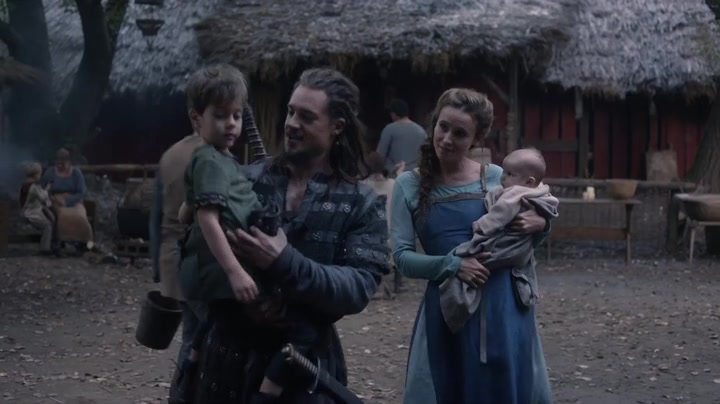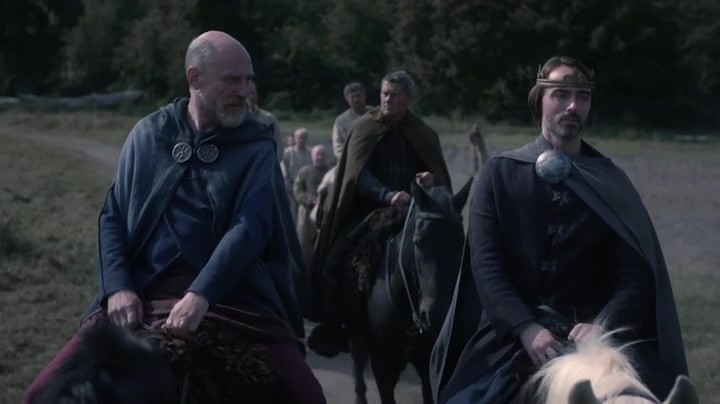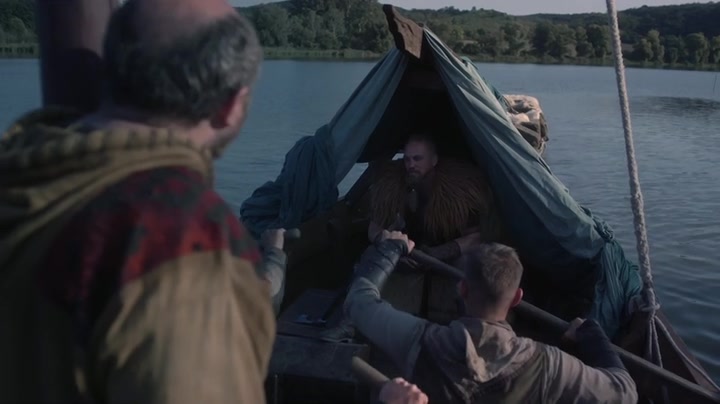The Last Kingdom – Season 2, Episode 5 Review
"A start of a new era"
After the exciting events of the
previous episode, where Uthred and Ragnar defended Kjartan at the Battle of Dunholm, Episode 5 of Season 2 feels more like a new start.
This episode starts three years after the Battle of Dunholm. Uthred is now the Earl of Coccham (the modern day village of Cookham, Berkshire),
he has fathered two children with Gisela, and his band of warriors fight off Danish raiders who attack villages to capture slaves. Despite being at the vanguard of protecting Wessex, King Alfred and his wife distrust Uthred because of his Paganism and his serving Alfred under duress. Uthred also receives Alfred's nephew, Aethelwold (Harry McEntire), who claims that he spoke with a man who has risen from the dead and prophesied that he is the rightful king of Wessex and asks the Northumbrian earl for help.

The episode starts off with a pre-credit sequence, like the season premieres have, and gives this episode the air of a mid-season premiere. The pre-credit sequence is essentially a prologue like in Bernard Cornwell's novels and gives the episode its action quota before jumping into the meat of the story. It sets up the new political dynamics and shows the hostility between Uthred and Alfred as they disagree on religion and the administration of justice. Alfred advocates an early form of English Common Law, where people are put on trial when accused of a crime, whilst Uthred is of the view that when he knows a suspect is guilty just hang them without delay. Their relationship swings like a pendulum - they work with each and against each other depending on their mood and have feelings of mutual respect and distant.
Alfred's wife, Aelswith (Eliza Butterworth), is even more hostile to Uthred and made out to be a horrible shrew - like when she chastises a servant for standing too close. Yet Alfred and Aelswith's daughter, Æthelflæd, is more positive towards Uthred, seeing him as a lucky charm for the family, as he is the man who helped Alfred defeat the Danes.

The episode also sets up the new political situation, as Æthelflæd has now come of age and is about to marry Æthelred
(Toby Regbo), cementing an alliance between Wessex and Mercia. As this goes on, tensions in Danelaw are rising due to the ruler converting to Christianity and forces within the occupied territory preparing to go to war with Wessex - ending the peace that was agreed on at the end of the previous season. This episode shows more of the political and religious debate within the Danish faction.
In this episode, Erik (Christian Hillborg) returns to England after Uthred exiled him and his brother. Erik reminds Uthred that he was raised as a Dane and is trying to sow seeds of doubt in the main character because of the animosity he has with his Saxon king and his affinity with Norse culture.
In Cornwell's novels, people are superstitious and it fuels some of their briefs. People believe in fortune telling, visions, monsters etc., and in this episode it fuels Aethelwold's ambitions to be king of Wessex and his goal of trying to convince Uthred that he is set to become king of Mercia. When Uthred crosses into Danelaw to meet the Danes his band witnesses a human sacrifice - a moment that could have fit in
Vikings - which results in a man raising from the grave. However, anyone who knows Cornwell's work will also know supernatural briefs can easily be manipulated.

Due to the time jump from the previous episode, there have been significant changes. The biggest change involves Beocca the priest (Ian Hart) and Uthred's adopted sister Thyra (Julia Bache-Wiig). At the end of the previous episode, Beocca convinced a traumatized Thyra, who believed that her brothers abandoned her, that they did everything they could to save her. Over the course of these
three years, Beocca fell in love with Thyra, despite their age difference and his religious vows. Unfortunately, the writer and director forget the basic rule of filmmaking: show, don't tell - the audience is not allowed to see a spark between the two - or Beocca's personal conflict, characters just say it happened. This storyline does lead to a little callback to the second episode of the first season, where Beocca advised Alfred to keep a woman he was lusting over around as servant because it was a test from God and Alfred pretty much says the same thing to his priest.
The other change involves Hild turning away from being a warrior and returning as a nun. In the episode there is a great empathize with in Hild removing her armor and replacing it with her religious clothing - a reverse to a similar scene in
Season 2, Episode 2. She also asks Uthred if she can build nunnery in Coccham, which he agrees to out of friendship and not because of his respect for Christianity.
This episode is, ultimately, an episode of exposition, designed to get audiences up to speed with circumstances in 9th century England. It does its job for the most part, although some storylines are only glanced at. The episode could easily have started a new season.
Pros
- A solid setup for future storylines
- The portrayal the Wessex and Danish political climates
- The use of the supernatural
Cons
- The relationship between Beocca and Thyra
 The episode starts off with a pre-credit sequence, like the season premieres have, and gives this episode the air of a mid-season premiere. The pre-credit sequence is essentially a prologue like in Bernard Cornwell's novels and gives the episode its action quota before jumping into the meat of the story. It sets up the new political dynamics and shows the hostility between Uthred and Alfred as they disagree on religion and the administration of justice. Alfred advocates an early form of English Common Law, where people are put on trial when accused of a crime, whilst Uthred is of the view that when he knows a suspect is guilty just hang them without delay. Their relationship swings like a pendulum - they work with each and against each other depending on their mood and have feelings of mutual respect and distant.
Alfred's wife, Aelswith (Eliza Butterworth), is even more hostile to Uthred and made out to be a horrible shrew - like when she chastises a servant for standing too close. Yet Alfred and Aelswith's daughter, Æthelflæd, is more positive towards Uthred, seeing him as a lucky charm for the family, as he is the man who helped Alfred defeat the Danes.
The episode starts off with a pre-credit sequence, like the season premieres have, and gives this episode the air of a mid-season premiere. The pre-credit sequence is essentially a prologue like in Bernard Cornwell's novels and gives the episode its action quota before jumping into the meat of the story. It sets up the new political dynamics and shows the hostility between Uthred and Alfred as they disagree on religion and the administration of justice. Alfred advocates an early form of English Common Law, where people are put on trial when accused of a crime, whilst Uthred is of the view that when he knows a suspect is guilty just hang them without delay. Their relationship swings like a pendulum - they work with each and against each other depending on their mood and have feelings of mutual respect and distant.
Alfred's wife, Aelswith (Eliza Butterworth), is even more hostile to Uthred and made out to be a horrible shrew - like when she chastises a servant for standing too close. Yet Alfred and Aelswith's daughter, Æthelflæd, is more positive towards Uthred, seeing him as a lucky charm for the family, as he is the man who helped Alfred defeat the Danes.
 The episode also sets up the new political situation, as Æthelflæd has now come of age and is about to marry Æthelred (Toby Regbo), cementing an alliance between Wessex and Mercia. As this goes on, tensions in Danelaw are rising due to the ruler converting to Christianity and forces within the occupied territory preparing to go to war with Wessex - ending the peace that was agreed on at the end of the previous season. This episode shows more of the political and religious debate within the Danish faction.
In this episode, Erik (Christian Hillborg) returns to England after Uthred exiled him and his brother. Erik reminds Uthred that he was raised as a Dane and is trying to sow seeds of doubt in the main character because of the animosity he has with his Saxon king and his affinity with Norse culture.
In Cornwell's novels, people are superstitious and it fuels some of their briefs. People believe in fortune telling, visions, monsters etc., and in this episode it fuels Aethelwold's ambitions to be king of Wessex and his goal of trying to convince Uthred that he is set to become king of Mercia. When Uthred crosses into Danelaw to meet the Danes his band witnesses a human sacrifice - a moment that could have fit in Vikings - which results in a man raising from the grave. However, anyone who knows Cornwell's work will also know supernatural briefs can easily be manipulated.
The episode also sets up the new political situation, as Æthelflæd has now come of age and is about to marry Æthelred (Toby Regbo), cementing an alliance between Wessex and Mercia. As this goes on, tensions in Danelaw are rising due to the ruler converting to Christianity and forces within the occupied territory preparing to go to war with Wessex - ending the peace that was agreed on at the end of the previous season. This episode shows more of the political and religious debate within the Danish faction.
In this episode, Erik (Christian Hillborg) returns to England after Uthred exiled him and his brother. Erik reminds Uthred that he was raised as a Dane and is trying to sow seeds of doubt in the main character because of the animosity he has with his Saxon king and his affinity with Norse culture.
In Cornwell's novels, people are superstitious and it fuels some of their briefs. People believe in fortune telling, visions, monsters etc., and in this episode it fuels Aethelwold's ambitions to be king of Wessex and his goal of trying to convince Uthred that he is set to become king of Mercia. When Uthred crosses into Danelaw to meet the Danes his band witnesses a human sacrifice - a moment that could have fit in Vikings - which results in a man raising from the grave. However, anyone who knows Cornwell's work will also know supernatural briefs can easily be manipulated.
 Due to the time jump from the previous episode, there have been significant changes. The biggest change involves Beocca the priest (Ian Hart) and Uthred's adopted sister Thyra (Julia Bache-Wiig). At the end of the previous episode, Beocca convinced a traumatized Thyra, who believed that her brothers abandoned her, that they did everything they could to save her. Over the course of these three years, Beocca fell in love with Thyra, despite their age difference and his religious vows. Unfortunately, the writer and director forget the basic rule of filmmaking: show, don't tell - the audience is not allowed to see a spark between the two - or Beocca's personal conflict, characters just say it happened. This storyline does lead to a little callback to the second episode of the first season, where Beocca advised Alfred to keep a woman he was lusting over around as servant because it was a test from God and Alfred pretty much says the same thing to his priest.
The other change involves Hild turning away from being a warrior and returning as a nun. In the episode there is a great empathize with in Hild removing her armor and replacing it with her religious clothing - a reverse to a similar scene in Season 2, Episode 2. She also asks Uthred if she can build nunnery in Coccham, which he agrees to out of friendship and not because of his respect for Christianity.
This episode is, ultimately, an episode of exposition, designed to get audiences up to speed with circumstances in 9th century England. It does its job for the most part, although some storylines are only glanced at. The episode could easily have started a new season.
Due to the time jump from the previous episode, there have been significant changes. The biggest change involves Beocca the priest (Ian Hart) and Uthred's adopted sister Thyra (Julia Bache-Wiig). At the end of the previous episode, Beocca convinced a traumatized Thyra, who believed that her brothers abandoned her, that they did everything they could to save her. Over the course of these three years, Beocca fell in love with Thyra, despite their age difference and his religious vows. Unfortunately, the writer and director forget the basic rule of filmmaking: show, don't tell - the audience is not allowed to see a spark between the two - or Beocca's personal conflict, characters just say it happened. This storyline does lead to a little callback to the second episode of the first season, where Beocca advised Alfred to keep a woman he was lusting over around as servant because it was a test from God and Alfred pretty much says the same thing to his priest.
The other change involves Hild turning away from being a warrior and returning as a nun. In the episode there is a great empathize with in Hild removing her armor and replacing it with her religious clothing - a reverse to a similar scene in Season 2, Episode 2. She also asks Uthred if she can build nunnery in Coccham, which he agrees to out of friendship and not because of his respect for Christianity.
This episode is, ultimately, an episode of exposition, designed to get audiences up to speed with circumstances in 9th century England. It does its job for the most part, although some storylines are only glanced at. The episode could easily have started a new season.